Graduate Certificate in Crisis, Risk, and Disaster Communication
Graduate Certificate in Crisis, Risk, and Disaster Communication (CRDC)
The CRDC certificate provides graduate students with unique communications skills to provide a proactive, readiness approach to address complex communication issues.
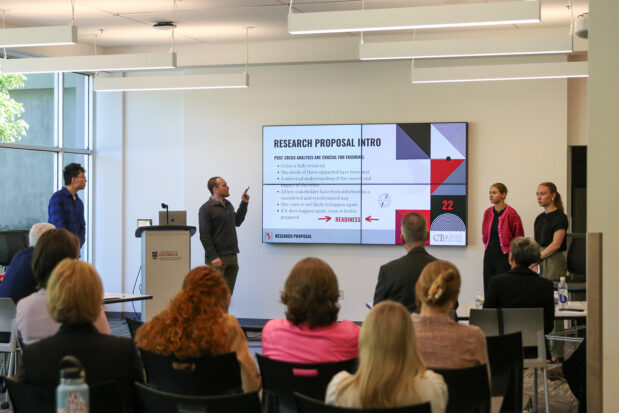
Overview
Effective communication and competency in crisis management leadership is pivotal for organizations and stakeholders in times of crisis, risk, and disaster. The Crisis Communication Think Tank (CCTT) , a thought leadership entity established in 2018 at the University of Georgia (UGA) and housed in the Grady College of Journalism and Mass Communication, has become a globally-recognized best practice model in building academia-industry collaborations among leading crisis scholars and practitioners through dialogue on emerging topics and co-creation of theory-driven, evidence-based advice for crisis research and practice.
In the world of crisis communicators, the academics who study this discipline and the practitioners who are immersed in it recognize two hard truths. First, we are seeing a dramatic rise in demand for crisis communicators worldwide. Second, most individuals are challenged when navigating through a crisis.
At the University of Georgia, academics and practitioners from industry, nonprofits and the public sector have worked collaboratively to prepare future leaders and executives in the crisis, risk and disaster communication practices. To educate the next generation of crisis communication leaders, based on the successful CCTT model of bridging academia and industry, this 12-credit graduate certificate program in crisis, risk, and disaster communication provides advanced learning about crisis, risk, and disaster communication through specialized coursework connecting theory and practice across sectors and industries. It is specifically aimed at students interested in obtaining in-depth and integrated education in the interdisciplinary areas of crisis and risk communication, risk management and disaster management.
ELIGIBILITY
- The CRDC graduate certificate is interdisciplinary, open to any UGA graduate student. All participants in the program must be graduate students currently enrolled at UGA or be able to show documentation of their acceptance for coursework at UGA. Students must be accepted into the CRDC certificate program and applications will be taken throughout the academic year and students will be admitted throughout the academic year accordingly. Students will be notified of their acceptance status through email and provided with instructions for registering for classes.
- The purpose of this graduate certificate is to provide students with advanced knowledge, skills, and experience across the fields of crisis, risk, and disaster communication management research and practice. The 12-credit graduate certificate has its program of study constructed with two core Grady College courses (6 credits). Depending on the desired study of focus and/or career orientation, students will choose two additional courses (6 credits) offered by the Terry College of Business and/or the College of Public Health.
- The certificate program offers two tracks: (1) business track in partnership with the Terry College of Business or (2) public health track in partnership with the College of Public Health. Given the growing need for organizational readiness, and the critical role of effective and ethical public communication in society, there is increasing demand for advancing the training of future leaders and executives in the crisis, risk, and disaster communication domains. Students in this certificate will acquire the knowledge and abilities needed to use communication to effectively respond to information needs, provide clear guidance in situations where uncertainties abound, and foster compliance with recommendations.
- The admission process requires an application packet containing: (1) a resume, and (2) a one-page written statement of goals and purposes pertaining to crisis, risk and/or disaster areas. To select candidates from a competitive, qualified application pool, the following criteria will be used: (1) Demonstrated strong competencies in written communication in crisis, risk, and, or disaster related areas; (2) Evidence of strong interest in advancing knowledge and career in crisis, risk, and disaster communication research and/or practice; and (3) Professional experience or evidence of preparedness as demonstrated by internship experience and/or hands-on project success in crisis, risk, and/or disaster related areas.
NOTE: Ph.D. students interested in pursuing the graduate certificate in Crisis, Risk, and Disaster Communication need to make sure they meet the UGA Graduate School requirement that Ph.D. students need to have at least 16 hours of 8000 or 9000 level coursework (not counting 9000 or 9300). This is a Ph.D. program requirement that is separate from the certificate requirements. Graduate courses that are 7000 level do not count toward the 8000 or 9000 level coursework requirement.
CERTIFICATE TRACK: HOW IT WORKS
The certificate’s curriculum is designed to be completed within the two years of study typically undertaken by students in master’s degree programs. Graduate student participants who successfully complete the certificate will have the advanced communication management knowledge, skills, hands-on experiences, and demonstrated competencies to work with organizational leaders, corporate and/or firm executives, community partners, media professionals, and key stakeholders in and outside organizations to effectively manage crisis, risk, and disaster threats and challenges.
The CRDC certificate requires 4 graduate courses (12 credit hours). Two core courses in journalism and mass communication, and two courses in management, risk management and legal studies for the business track or two courses in disaster management for the public health track.
JRMC 8170 – Risk Communication
This course provides an introduction to the field of risk communication, a topic that has been receiving increased attention because of terrorism threats. Theories and research about risk communication come primarily from five domains: environmental disasters, personal risk-taking behaviors, industrial hygiene, terrorism, and crises of corporate reputation. Students will examine the theories, research, and practical applications of risk communication in each of those domains.
JRMC 8180 – Crisis Communication and Strategic Conflict Management
Introduction to the field of crisis communication, a topic essential to organizational wellbeing and public safety, grounded in crisis communication and strategic conflict management frameworks that aim at strengthening preparedness, resilience, and readiness. Students will examine crisis communication and management theories and applications in an increasingly complex issue landscape and competitive media environment across organizational and public crisis arenas.
MGMT 7011 – Leading Evolving Organizations
This course takes students through the stages of an organization’s existence and its corresponding leadership needs, plus looks at specific situations such as leading in crisis. The course will focus on identifying and building leadership skills, and enabling students to match organizational lifestage to leadership style, facilitating appropriate career choices.
RMIN 7010 – Fundamentals of Risk Management
Introduces the student to the fundamentals of risk management. After discussion of the importance of risk and the rationale for risk management, the course will analyze the risk management process and various risk management methods. Current issues and recent developments will also be discussed.
RMIN 7100 – Fundamentals of Risk Management
Fundamentals of Risk Management and Insurance, with emphasis on risk financing through the use of insurance, retention, and non-insurance transfer agreements.
LEGL 7250 – Legal Risk: Management, Strategy, and Communication
Comprehensive exploration of legal risk, encompassing compliance, contract, liability, and policy risk domains. Legal risk management principles based on international frameworks. Strategic implications of legal risk and how it informs organizational decision-making. Effective communication strategies for legal risk, including best practices for engaging with multiple stakeholders during both ‘peacetime’ and crisis situations.
DMAN 7100 – Introduction to Disaster Management
An in-depth overview of the principles of disaster management, including the history of disaster management, examination of the four phases of disaster management, introduction to federal emergency management functions, and basic disaster terminology.
DMAN 7400 – Public Health Crises and Disaster Management
Provides an in-depth analysis of case studies involving large-scale national and international disasters.
DMAN 7450 – Geographic Information Systems (GIS) and Disasters
An introduction to emergency operations and disaster management – from mitigating and planning for disasters to responding to and recovering from them. Students will learn how their personal and community emergency preparedness can be improved, and about the careers and opportunities available in disaster management.
DMAN 7650 – Disaster Mental Health Overview
An overview of disaster mental health, including information about: traumatic stress brought on by disasters and the impact that has on individuals and communities; the role of the public mental health system; the importance of continuity of operations (COOP) to ensure that routine services continue and behavioral health support for disaster survivors and responders is provided; disaster mental health skills and interventions; various disaster mental health training models that are used; and the importance of self-care for all disaster responders.
Keystone Experience
The Hedge Fund: Venture Between the Hedges
The Hedge Fund: Venture Between the Hedges provides students a keystone experience in the graduate certificate program. The Hedge Fund is a new “Shark Tank” style pitch competition with industry experts serving as the judges and investors for the winning team. The student teams are comprised of students in Dr. Yan Jin’s graduate Crisis Communication and Strategic Conflict Management course.
Each team is tasked with creating a comprehensive crisis communications strategy for a simulation event, as well as a research proposal where they will identify a key research question and pitch a new research project. Both project parts needed to include competencies learned throughout the semester including, but not limited to, planning, preparation, mitigation, response/management, short-term crisis response assessments and long-term crisis impact measurements.The competition format provides graduate students the unique experience of learning by doing and competing based on teamwork and understanding of industry trends. The winning team, which presents the top research paper, will be supported by funds going toward further development for their research project under the direction of Jin and the Crisis Insights & Analytics Lab. More about The Hedge Fund: Venture Between the Hedges can be found here.
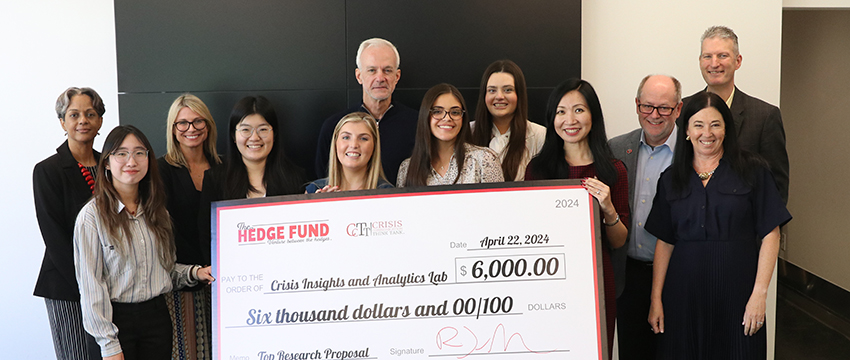
Faculty
-
Learn More
James M. Carson
Department Head, Department of Insurance, Legal Studies and Real Estate Terry College of Business, UGA
James M. Carson
Department Head, Department of Insurance, Legal Studies and Real Estate Terry College of Business, UGA
Department Head, Department of Insurance, Legal Studies and Real Estate
Terry College of Business, UGA -
Learn More
Jason Epstein
Lecturer, Legal Studies Terry College of Business, UGA
Jason Epstein
Lecturer, Legal Studies Terry College of Business, UGA
Lecturer, Legal Studies
Terry College of Business, UGA -
Learn More
Curt Harris
Director of Institute for Disaster Management, College of Public Health, UGA
Curt Harris
Director of Institute for Disaster Management, College of Public Health, UGA
Dr. Curt Harris is the Director, Associate Professor, and Graduate Coordinator for the Institute for Disaster Management (IDM) in the College of Public Health at the University of Georgia. As Director, Dr. Harris oversees the educational programs at the undergraduate and graduate levels and sets the research and outreach agendas for IDM. Dr. Harris is an internationally renowned leader in public health preparedness and emergency management with over 15 years of experience. His area of expertise focuses on the practical application of preparedness and how appropriate development and testing of plans, policies, and procedures can ultimately influence public health outcomes during disasters. -
Learn More
Yan Jin
CCTT Director, Co-Founder
Yan Jin
CCTT Director, Co-Founder
C. Richard Yarbrough Professor in Crisis Communication Leadership, Professor of Public Relations and Associate Director of Center for Health & Risk Communication, Grady College of Journalism and Mass Communication.
-
Learn More
Glen Nowak
CCTT Co-Founder
Glen Nowak
CCTT Co-Founder
Associate Dean for Research and Graduate Studies, Co-Director of Center for Health & Risk Communication, Professor, Advertising & Public Relations, Grady College of Journalism and Mass Communication.
-
Learn More
Mike Pfarrer
Terry College of Business, UGA
Mike Pfarrer
Terry College of Business, UGA
Terry Distinguished Chair of Business Administration, Associate Dean for Research and Executive Programs
Terry College of Business, University of Georgia -
Learn More
Morgan Taylor
College of Public Health, UGA
Morgan Taylor
College of Public Health, UGA
Associate Director of Institute of Disaster Management
Assistant Research Scientist
Assistant Director, UGA Medical Reserve Corps
CONTACT US

Dr. Yan Jin
C. Richard Yarbrough Professor in Crisis Communication Leadership; Professor of Public Relations; Director of Crisis Communication Think Tank; Associate Director of Center for Health & Risk Communication
The Latest
Catch up on the latest news with the Graduate Certificate in Crisis, Risk, and Disaster Communication.
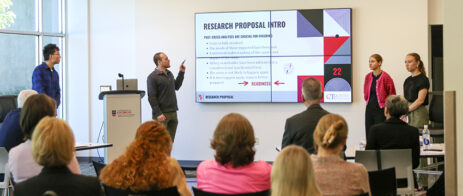
Graduate Certificate in Crisis, Risk, and Disaster Communication approved for Fall 2024
The University of Georgia has been approved to offer a Graduate Certificate in Crisis, Risk, and Disaster Communication (CRDC), a program that will educate students in skills needed for proactive, […]
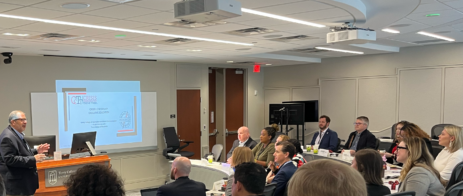
Inaugural partnership among Grady College, Terry College and UGA Executive Education draws industry leaders to crisis management workshop
Grady College’s Crisis Communication Think Tank (CCTT) partnered with the Terry College of Business and UGA Executive Education on a crisis readiness program for business leaders on Friday, April 12, […]

Crisis Communication Hedge Fund provides motivation for graduate student research
The Hedge Fund: Venture Between the Hedges is providing more than just motivation for students in the Graduate Crisis Communication course at Grady College. The winning team’s proposal will be […]
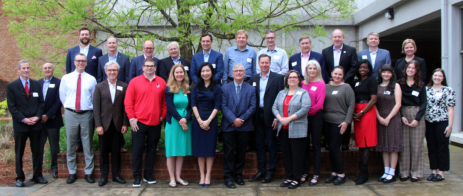
Annual CCTT gathering explores READINESS as a new crisis management model
The Crisis Communication Think Tank (CCTT) hosted its annual event at Grady College of Journalism and Mass Communication on Thursday, April 11, 2024. Under the year’s overarching theme of READINESS, […]

Profiles of Tenacity: Kathryn Penn
Kathryn Penn is a fourth-year public relations student interested in crisis communications. She encourages students to seek mentorship and peer networking opportunities to form a supportive community at UGA. Why […]
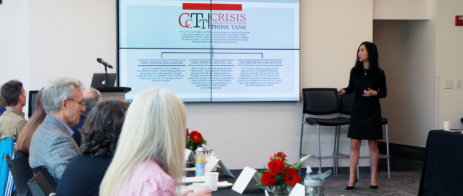
UGA’s Grady College and Terry College to offer executive education program in crisis communication and management
The University of Georgia’s Grady College of Journalism and Mass Communication and Terry College of Business have partnered to offer an executive education program in crisis communication and management. This […]
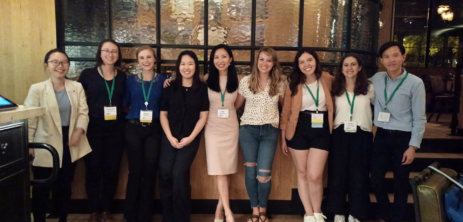
Cross-institutional collaboration sparks student research on AI, crisis communication
When students from the University of Georgia and Penn State met to kick off a research partnership this past August, they quickly realized they were gaining more than a line […]

Perspectives
“Conducting research in crisis communication was a powerful complement to my degrees. I am so grateful for the opportunity to deepen my understanding of strategic communication and organizational crises, both as a communicator and leader. Especially in modern media environments, swift and tactful navigation of crises is essential to organizational leadership, and I feel well prepared to enter the workforce with a solid foundation in this skillset.”
Schwarzman Scholar, 2024
Elise Karinshak
BS ’23, BBA ’23

Perspectives
“I do feel that as a PR professional this certificate and its associated courses would be beneficial for anyone to have as they pursue a career in communications. It’s not the mastery – that comes with years of practice and doing – but the exposure to best practices, standards and strategic plan building around times of crisis and/or disaster in the classroom that will set students with this certificate apart as they will be more prepared to understand and react to these types of situations when the time comes in their careers.”
Laura Burr
AB ’21

Perspectives
“During my Ph.D. studies, Grady College provided me the opportunity to fulfill my career aspirations and helped me to grow academically and professionally. I feel certain that Grady College offered me with the ideal mix of academic rigor, resources, and mentors expert in crisis, risk, and disaster communication of my interests. I would highly recommend this certificate program to anyone interested in pursuing a career in crisis, risk, and disaster communication.”
Sungsu Kim
Ph.D. ’19
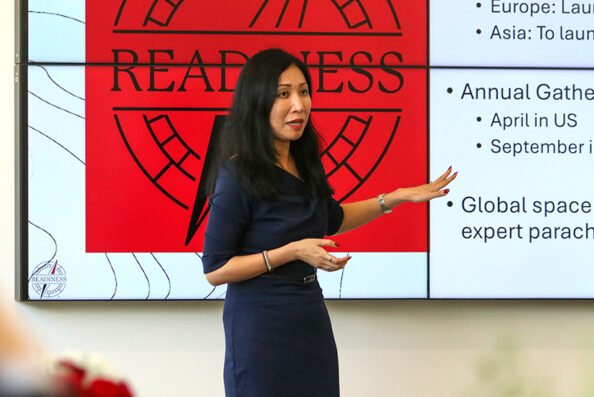
Apply To The Certificate
Applications for the CRDC certificate are open all year round. Visit the CRDC Eligibility page for application dates and details.






